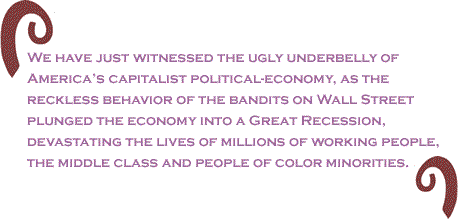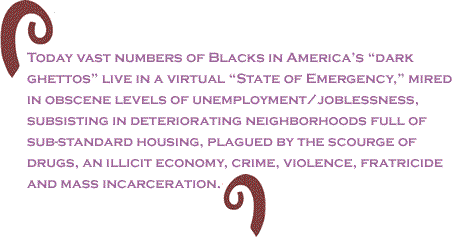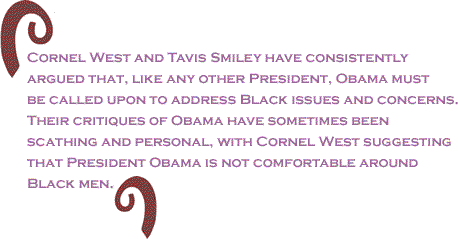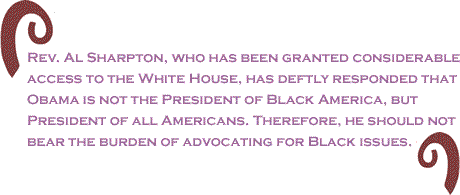| Beyond
Obama and the Democrats, if there is to be an independent
force to fight for progressive change, the question is,
what role will people of African descent, Black people,
play in the process? This is particularly crucial since
the vast majority of African Americans are proud of the
fact that America finally has a Black President. Indeed,
there are some within the Black community who embrace the
notion that the election of Barack Obama marks the advent
of a �post racial society.� Others do not go that far but
raise concerns about the relevance of a �Black Agenda� with
a Black President in office; that is to say, should Blacks
pressure a Black President to openly address Black issues.
Far from accepting the notion of a post-racial society,
there is also substantial sentiment in the Black community
that because racism is still a factor in this country, pressing
Obama to address Black issues will solidify opposition to
his presidency. Then there are those who are simply content
to bask in the psycho-cultural achievement of having a Black
family in the White House.
 Recently
variations of these positions have provoked a fierce debate
among noted African American public intellectuals, talk
show hosts and political activists like Cornel West, Rev.
Al Sharpton, Tavis Smiley, Tom Joyner and Boyce Watkins.
Cornel West and Tavis Smiley have consistently argued that,
like any other President, Obama must be called upon to address
Black issues and concerns. Their critiques of Obama have
sometimes been scathing and personal, with Cornel West suggesting
that President Obama is not comfortable around Black men.
Rev. Al Sharpton, who has been granted considerable access
to the White House, has deftly responded that Obama is not
the President of Black America, but President of all Americans.
Therefore, he should not bear the burden of advocating for
Black issues. Boyce Watkins correctly took Professor West
to task for personalizing his critique but seems to agree
that Obama should address Black issues. Tom Joyner was so
incensed by Tavis Smiley�s demands on Obama that he essentially
labeled him disloyal and banned him from ever appearing
on the Morning Show again.� The role of a Black Agenda
and the relevance of Black politics in the age of Obama
is a hotly contested topic in Black America, as well it
should be. Recently
variations of these positions have provoked a fierce debate
among noted African American public intellectuals, talk
show hosts and political activists like Cornel West, Rev.
Al Sharpton, Tavis Smiley, Tom Joyner and Boyce Watkins.
Cornel West and Tavis Smiley have consistently argued that,
like any other President, Obama must be called upon to address
Black issues and concerns. Their critiques of Obama have
sometimes been scathing and personal, with Cornel West suggesting
that President Obama is not comfortable around Black men.
Rev. Al Sharpton, who has been granted considerable access
to the White House, has deftly responded that Obama is not
the President of Black America, but President of all Americans.
Therefore, he should not bear the burden of advocating for
Black issues. Boyce Watkins correctly took Professor West
to task for personalizing his critique but seems to agree
that Obama should address Black issues. Tom Joyner was so
incensed by Tavis Smiley�s demands on Obama that he essentially
labeled him disloyal and banned him from ever appearing
on the Morning Show again.� The role of a Black Agenda
and the relevance of Black politics in the age of Obama
is a hotly contested topic in Black America, as well it
should be.
Much
of my life�s work as a social and political activist has
been devoted to shaping the theory and practice of Black
politics as a tool in the Black Freedom Struggle. Nothing
more than the National Black Political Convention in Gary
in 1972 has influenced my view of the role of Black politics
in achieving the liberation of African Americans and oppressed
people in this country. The Preamble to the National Black
Agenda adopted at the Convention is entitled - The Gary
Declaration: Black Politics at the Crossroads. It is
a profound document which provided an incisive analysis
of the conditions confronting Black America and the vision
and mission of Black politics in achieving liberation. After
chronicling the myriad maladies afflicting Black people,
the Declaration offered the following analysis: �The crises
we face as Black people are the crises of the entire society.
They go deep, to the very bones and marrow, to the essential
nature of America�s economic, political, and cultural systems.
They are the natural end-products of a society built on
the twin foundations of white racism and white capitalism.�

The
unambiguous assessment was that there are basic flaws in
the American political economy which were barriers to Black
freedom. In fact the Declaration states that �this system
does not really work in favor of the humanity of anyone
in America.� Then the Declaration asserts that Blacks cannot
depend on either major political party to be the primary
arbiter of our liberation: �Both parties have betrayed us
whenever their interests conflicted with ours (which was
most of the time), and whenever our forces were unorganized
and dependent, quiescent and compliant.� Having laid out
an analysis of the Black condition and the unreliability
of the major parties in promoting Black interests, the document
calls for a �new Black politics� to advance the interests
and aspirations of Africans in America: �� The Black Politics
of Gary must accept major responsibility for creating both
the atmosphere and the program for fundamental, far-ranging
change in America�It is the challenge to consolidate and
organize our own Black role as the vanguard in the struggle
for a new society.�
As
noted, the Declaration was the preface, the preamble for
the Black Agenda which was adopted by the delegates. It
concluded: �We move recognizing that no one else is going
to represent our interest but ourselves. The society we
seek cannot come unless Black people organize to advance
its coming. We lift up a Black Agenda recognizing that white
America moves toward the abyss created by its own racist
arrogance, misplaced priorities, rampant materialism, and
ethical bankruptcy. Therefore, we are certain the Agenda
we now press for in Gary is not only for the future of Black
humanity, but is probably the only way the rest of America
can save itself from the harvest of its criminal past.�
What a powerful document and awesome charge for Africans
in America to shoulder! It has served as my �political Bible�
for nearly four decades.
I
cite these passages from the Gary Declaration because
nearly 40 years after the adoption of the National Black
Agenda, the analysis and charge offered are relevant to
the raging debate about how to relate to America�s first
African American President, as well as the question of the
role Blacks should play in forging an independent force
for change in this period.� Just as America has a generation
that has lost touch with the contributions and legacy of
the liberal/progressive movement, Black America has a generation
that has little or no knowledge of contribution and legacy
of the Gary Black Political Convention to the evolution
and development of Black politics.� The lesson of Gary was/is
that an oppressed people must have a clear assessment of
their condition and an analysis of the barriers blocking
the path to liberation. This clarity must form the foundation
for an Agenda that the oppressed group must advocate for,
utilizing whatever avenues available to shatter the shackles
of bondage; a struggle that must ultimately involve striving
to dismantle oppressive structures, institutions and systems
if total liberation is to be achieved. The Gary Declaration
charged Black people with advancing a politics of social
transformation in the quest to build a new society.
Today
vast numbers of Blacks in America�s �dark ghettos� live
in a virtual �State of Emergency,� mired in obscene levels
of unemployment/joblessness, subsisting in deteriorating
neighborhoods full of sub-standard housing, plagued by the
scourge of drugs, an illicit economy, crime, violence, fratricide
and mass incarceration. And, we have just witnessed the
ugly underbelly of America�s capitalist political-economy,
as the reckless behavior of the bandits on Wall Street plunged
the economy into a Great Recession, devastating the lives
of millions of working people, the middle class and people
of color minorities. It is certainly laudable that racial
attitudes have changed to the degree that enough White Americans
voted for Barack Obama to contribute to his election as
President. However, his ascension to the White House has
not fundamentally changed the plight of millions of Blacks
imprisoned in America�s dark ghettos or transformed the
structures and institutions of capital and finance which
can produce misery and pain for masses of Americans. Setting
aside the unnecessary personal nature of his critiques,
Cornel West is absolutely correct to insist that African
Americans have the right and obligation to monitor the policy
initiatives and outcomes of the Obama presidency and any
administration, to promote and protect the interests and
aspirations of Black people. As former Congressman Walter
Fauntroy constantly reminds us, politics is not merely about
cosmetics and symbols. It is about engaging the electoral
process to extract human and material resources to meet
the needs of one�s constituency. This is exactly why the
Institute of the Black World 21st Century established the
Shirley Chisholm Presidential Accountability Commission
as a body to institutionalize the process of monitoring
presidential administrations as it relates to Black interests.

Substance
trumps symbolism especially when huge sectors of Black America
are in a State of Emergency. Hence, beyond the potential
historical significance of the moment, Blacks should have
marched on ballot boxes in 2008 with the expectation that
Barack Obama and the Democrats would reward our support
by advancing the interests of workers, the middle class
and the poor, as well as the needs/concerns of Black people!
Otherwise, what�s the point of participating in the electoral
political process? President Obama has initiated policies
like Health Care Reform, increasing Pell Grants and a Stimulus
Bill on the theory that �a rising tide lifts all boats.��
He has also appointed Justices to the Supreme Court who
will block a complete takeover of the highest Court in the
land by conservatives. Moreover, he increased funding for
Historically Black Colleges and Universities and directed
Attorney General Eric Holder to strengthen enforcement of
civil rights and anti-discrimination statutes and regulations.
Obama
is to be commended for these accomplishments, and he certainly
has proven to be better than what we might have expected
from a McCain presidency.� But, it is also fair to say that
he has failed to provide bold leadership on a range of issues
affecting working people, the middle class and the poor,
frequently pre-maturely compromising with the conservatives
in the name of bi-partisanship. Equally important, from
the perspective of a Black Agenda, he has failed to unveil
a visible urban policy and stubbornly refused to develop
a targeted jobs program to combat chronic Depression levels
of joblessness in the Black community. Under the leadership
of Congressman Emmanuel Cleaver, the Congressional Black
Caucus recently held a press conference urging the President
to directly address the disproportionate joblessness in
Black communities. Marc Morial, President of the National
Urban League and other civil rights/human rights leaders
have consistently pressed Obama on the same issue. Thus
far the President has failed to respond. This is a legitimate
source of concern and frustration among many Black leaders
and commentators. However, this does not mean Blacks will
abandon the President in the 2012 election.
President
Obama is not unique in his reluctance to address Black issues.
In the face of the White backlash against progress in the
60s and the rise to prominence of conservatives, Blacks
have complained about the performance of Democrat and Republican
Presidents as it relates to a Black Agenda. But, expectations
have been higher for the Democrats since Blacks have pragmatically
delivered their votes to the Party by huge majorities since
the election of John F. Kennedy in 1960. Democrats have
correctly been viewed as marginally better than the Republicans
on issues that matter most to Blacks. However, the performance
of President William Jefferson Clinton is illustrative of
the reluctance of Democrats to specifically address Black
issues. For all of the talk about Bill Clinton as the �first
Black President,� he failed to advance an urban policy to
ameliorate the conditions in urban inner-city areas. Though
he did convene a �national conversation on race,� bowing
to the tenor of the times, he avoided advocating race based
remedies to address the desperate plight of Blacks in America�s
inner-cities. The best that could be said of Clinton is
that he appointed a number of Blacks to high level positions,
he was adept at relating to Blacks personally and symbolically
and his �centrist� policies were preferable to the reactionary
agenda of the radical right. Hence Clinton was seen as the
dam blocking a potential flood by the radical right. Perennially
caught in this political bind, the cold reality is that
in recent years Black voters have never been rewarded by
the Democrats in proportion to our support for the Party
at the ballot box or in proportion to our needs. Therefore,
Blacks have every reason to play a leading role in forging
an independent, progressive force for change beyond the
Democrats -- a force dedicated to educating and motivating
a majority of the electorate to adopt and act on a liberal/progressive
vision of America.

While
there have always been different political tendencies among
Africans in America, there is little doubt that what Professor
Cornel West calls the radical democratic tradition of liberal/left/progressive
thought and action has been a dominant force driving the
struggle for liberation of Blacks and oppressed people.
Even Black Republicans in the era of the 60�s were liberals
deeply concerned about advancing a Black Agenda of �freedom
and justice for all.��� Jackie Robinson was a Rockefeller
Republican. Senator Edward Brooke of Massachusetts was a
liberal, and Art Fletcher, Advisor to President Nixon, was
the architect of the Philadelphia Plan which became the
blueprint for affirmative action. These Republicans were
a far cry from the current crop of Black conservatives whose
claim to fame is their view that race does not matter; Black
conservatives who have volunteered or been persuaded to
co-sign what is an essentially an anti-Black, anti-labor,
anti-gender equality, anti-gay and lesbian, anti-environment,
pro-corporate agenda. But, Black conservatives are a miniscule
minority. The liberal/progressive political tendency is
still the dominant/mainstream tendency in Black America.
As a case in point, since its inception, the Congressional
Black Caucus has often been referred to as the �conscience
of the Congress!�
It
is this liberal/progressive tendency in the Black Freedom
Struggle that Africans in America must now fully embrace
and expand as we seek to assume our rightful place in the
forefront of the fight for a more just and humane society
as envisioned in the Gary Declaration. This is why the National
Rainbow Coalition was so incredibly important. It grew out
of the Black Freedom Struggle and placed the interests,
aspirations and concerns of Blacks and other people of color
at the center of the �economic common ground agenda� articulated
as the framework for a new America. This concept of the
centrality of the issues and leadership of Blacks and people
of color is critically important in terms of forging a formidable
independent force for change because historically White
liberals/progressives have often sought to downplay issues
of race, ethnicity and culture as detrimental to building
bonds of working class unity. Or, there has been an inability
to include Blacks and people of color in a manner that would
avoid liberal/left progressive formations being overwhelmingly
White in composition. Because of its origins, that was never
a problem with the Rainbow Coalition.�
The
Gary Declaration provided the rationale for the centrality
of Black leadership in the struggle for a new society: �That
responsibility is ours because it is our people who are
most deeply hurt and ravished by the present systems of
society.� If Blacks and people of color are to play a leading
role in the Progressive National Convention and the creation
of an independent liberal/progressive mechanism beyond Obama
and the Democrats, this issue must be firmly addressed.
Formulas must be devised to structurally ensure the centrality
of the agendas and leadership of Blacks and people of color.�
There is a precedent for this in the little known Progressive
National Convention organized by the National Independent
Politics Network in 1992 in Ypsilanti, Michigan. There may
be other historical precedents as well. No matter the source,
the vision, vitality and longevity of a new independent
progressive force for change will be best served if it has
a �Rainbow� composition and character.

As
Africans in America prepare for the 2012 elections, we must
be clear that President Barack Hussein Obama is the firewall
thwarting the virus of radical conservatism from decisively
turning back the clock on Black progress and the march toward
a more perfect union by the progressive forces for change.
Therefore, while we offer constructive critiques of his
performance on issues of vital concern to Blacks and other
similarly situated constituencies, it is in our best interest
to turn back the conservative tide by supporting Obama�s
reelection for President. But, we must be equally clear
that, left to their own devices, Obama and the Democrats
have retreated from the cutting edge of advancing a politics
of social transformation to create a far more just and humane
society than we have at present. Accordingly, to be true
to the dominant radical liberal/progressive tradition that
has �brought us thus far on the way,� it is imperative that
we play a leading role in the fight for a new society. The
Gary Declaration put it this way: �The challenge is to transform
ourselves from favor-seeking vassals and loud talking �militant�
pawns � to take up the role that the organized masses of
our people have always attempted to play since we came to
these shores: That of harbingers of true justice, humanity,
leaders in the struggle for liberation.� We dare not betray
that legacy. Beyond Obama and the Democrats, let us prepare
to assume our role in galvanizing an independent liberal/progressive
force for �fundamental, far-ranging change� in this nation!

Note:
This commentary is the fourth part in a series titled: Beyond
Obama and the Democrats
Click here to read any commentary in this BC series.
Click here to send a comment to all the participants
in this BC series.
BlackCommentator.com
Guest Commentator Dr. Ron Daniels, PhD is President of the Institute
of the Black World 21st Century and Distinguished Lecturer
at York College City University of New York. His articles
and essays also appear on the IBW website www.ibw21.org
and www.northstarnews.com. Click here
to contact Dr. Daniels.
|

